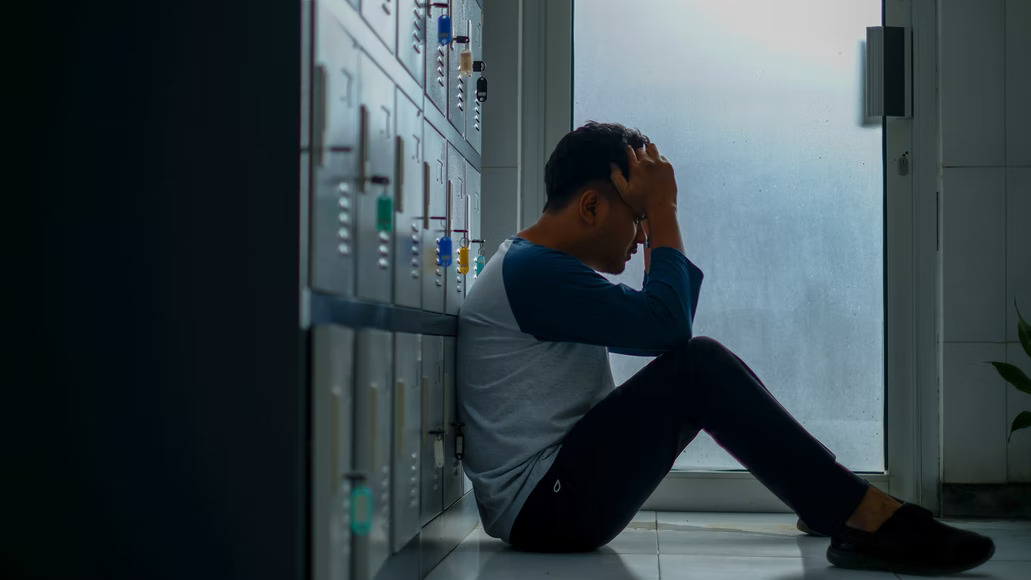
The times that we live in are all about keeping up with a fast-paced life that lacks exercise and nutrition and dealing with different kinds of pressures. And this often puts us on an emotional rollercoaster. Over time, stress and anxiety become a part and parcel of our life, causing us to feel overwhelmed and worn down.
So how do you maintain your emotional wellbeing?
The first step is to identify your emotions, i.e., whether you are stressed, anxious, or worried, and then take necessary steps to manage them. It is especially important to know about stress vs anxiety, how to tell the difference.
What is the difference between stress and anxiety?
Imagine this situation. You are in the office swamped with work and your boss calls you to help with an urgent presentation due in an hour. A heaviness settles in your stomach while you think about your existing workload and saying no to your boss.
At the same time, your brain begins to tell you how you have often crumbled under pressure. How your colleagues are much better at doing this and how you are always stuck in this cycle.
The first response is stress and the second is anxiety.
We often use the terms ‘stress’ and ‘anxiety’ interchangeably. But they are not synonyms. There is a difference between stress and anxiety.
So, what’s the difference between anxiety and stress? While they both are normal responses to the challenges that we face in life due to our work, relationships, family, and have shared symptoms, this is where the similarity ends.
Let’s decode stress vs anxiety and work out the means to get relief.
What is stress?
Stress is defined as your body’s response to an external situation, demands, or triggers. These could be an illness, discrimination at work, persistently tight deadlines, etc. It usually makes itself known through feelings of tension and heaviness in the mind.
Then there is something known as acute stress. This is known as the ‘fight or flight’ response and is coupled with intense feelings and physical symptoms.
When this stress doesn’t abate and becomes a constant fixture in your life, it becomes chronic. Chronic stress is defined as feeling under pressure or being overwhelmed all the time and can lead to long-term mental and physical health issues.
What is anxiety?
Anxiety is defined as persistent worrying that occurs even in the absence of a trigger. This includes feelings of jitteriness, fear, and negative self-talk.
While anxiety usually comes and goes, when it stays with you for a long time, it is classified as an anxiety disorder. This is a medical condition that needs to be addressed.
What is worry?
There is a third element of this curve too – worry. Worrying happens when your mind brings up repetitive negative thoughts about things that could go wrong.
When it comes to stress vs anxiety vs worry, it can be understood as stress + worry = anxiety.
While stress affects your body, worry affects your mind, and anxiety affects both your body and mind.
What is the difference between stress and anxiety symptoms?
Now that we know the difference between stress and anxiety, let us understand their symptoms.
There are several similarities between stress vs anxiety symptoms.
When a person is stressed, they may feel any of these symptoms:
- A racing chest or palpitations
- Faster breathing
- Irritability, unhappiness, overwhelm, or anger
- Dizziness or nausea
- Exhaustion
- Inability to sleep
- Sweaty palms or feet
- Muscle tension
- Pain in the neck or back
- Jaw clenching
- Digestive problems such as constipation or diarrhoea
During anxiety, a person may experience:
- Startled responses
- Difficulty in controlling negative or overwhelming thoughts
- Restlessness
- A blank mind or inability to focus
- Muscle aches and pains
- Headache
- Stomach problems
- Dizziness
- Pins and needles or numbness in legs or arms
- Shortness of breath
- Excessive sweating
What is the difference between stress and anxiety causes?
Contrary to popular notions, there is a difference between stress and anxiety causes.
Stress usually occurs as a response to an external event that acts as a stressor. These may include:
- A work deadline
- Relocation
- A fight with a friend
- Starting at a new place of study or work
- Waiting for a medical test result
- Big life changes such as getting married or having a baby
On the other hand, anxiety gets triggered internally. It is usually caused due to:
- Growing up in a high-strung household with parents displaying anxious behaviours
- Past experiences of neglect, bullying, abuse, or discrimination of any kind
- Feelings of being negatively perceived
- Perception of a situational threat
- Chronic stress
Additionally, a common factor that has been found to cause stress and anxiety is lack of exercise and nutrition in your schedule.
How do stress and anxiety affect you?
When you feel entrapped in a fight or flight response, your body releases stress hormones such as cortisol and adrenaline. While short-term stress, anxiety or worry and their associated hormones may be helpful in the right situations in boosting your response and performance, when they become chronic, they begin to have a negative impact on your emotional and physical wellbeing.
So, it becomes important to not only understand the difference between stress and anxiety, but also how they affect you in the long run:
- Constantly being in a cycle of stress and anxiety affects the frontal lobes of your brain and has a direct impact on your cognitive functioning. When you don’t know stress vs anxiety difference and don’t tackle them in time, you may develop full-blown conditions such as panic disorder, post-traumatic disorder, and obsessive-compulsive disorder.
- Several studies have shown that constant stress and anxiety leave you with debilitating physical symptoms such as constant headaches, pains and aches, fatigue, or digestive disorders.
- Since anxiety and stress cause an increased heart rate and high blood pressure, they may damage your arteries and increase your risk of cardiovascular problems.
- Not knowing the impact of stress vs anxiety (how to tell the difference) may cause your immune system to weaken over time, leaving you susceptible to infections.
- Stress and anxiety have a drastic impact on your moods. You may find yourself fluctuating between states of restlessness, overwhelm, anger, irritability, sadness, and lack of motivation.
- These conditions have a direct impact on your productivity at work and your interpersonal relationships.
- When you don’t know the difference between stress and anxiety and don’t address it in time, it may lead to dependence on risky behaviours. These may include overeating, drug abuse, use of alcohol or smoking, etc.
With enough evidence such as the above-mentioned pointers, it becomes even more imperative to know the difference between anxiety and stress and find natural ways such as yoga, meditation, and nutrition to manage it.
How are stress and anxiety treated?
Merely understanding stress and anxiety difference will not make them go away. You need to take practical steps to manage these daily.
In case you experience any of the above-mentioned symptoms, it is essential to take stress vs anxiety tests.
Once a stress and anxiety test confirms your diagnosis, your treatment will begin. The treatment depends on factors like the severity of your condition, your age, and general health. Some lines of treatment by a professional include therapy and medications including anti-depressants or selective serotonin reuptake inhibitors. However, these medications come with their set of side effects such as nausea, tiredness, constipation, etc.
So, what’s the best way to treat stress and anxiety holistically and without side effects? The answer is natural remedies including yoga, balanced nutrition, and meditation. These are more accessible, don’t have any adverse effects, and treat the root cause of stress and anxiety instead of giving a stop-gap solution. Some of the best natural interventions include:
Daily self-management: It is important to make lifestyle changes to combat the debilitating impact of stress on your life. These include:
- Train your mind to focus your energies on productive things. Techniques such as mindfulness and relaxation are great ways to do this and are easily available through guided tools online.
- Cultivate a social circle of trusted friends and family. They won’t just listen and empathize but may also give you a new perspective on your thoughts.
- Studies have proven the impact of nature on stress and anxiety levels. Being amidst greenery and quietude for even 20-minutes in a day can make your feel better, reduce stress, and regulate your heart rate and blood pressure.
- Since stress and anxiety cause your muscles to ache and tense up, you can easily tackle this by moving around and exercising. Yoga combined with meditation is especially found to be very effective in helping you relax and calm your mind.
- Journaling your thoughts, especially what triggers stress and anxiety, can help you in tackling them better the next time.
- What you eat has a direct impact on your stress levels. Consuming a nutritious diet and keeping yourself hydrated increase your serotonin levels that calm your brain, reduce inflammation, and regulate your blood pressure.
- Limit the consumption of stimulants such as alcohol and caffeine.
- Lighten up your schedule and instead of juggling a thousand daily chores, keep some ‘me’ time aside. Use this time to pursue your hobbies, which is a great way to relax and quieten your mind.
Finally, learn to say NO! It might need a bit of practice but is worth it. This doesn’t mean shirking your responsibilities. It just lets you give yourself and your mental health a priority especially when you are too busy and can’t take up more.
Conclusion
Learning the difference between stress and anxiety can help you appreciate the difference between a life lived to its full potential and otherwise. So, rediscover healthy and natural ways such as yoga, meditation, and nutrition to enjoy a stress-free life.
Frequently Asked Questions
What benefits does meditation offer for managing stress and improving sleep?
FlexifyMe's meditation sessions are crafted to aid in stress relief and enhance sleep quality, forming an integral part of our comprehensive wellness programs.
Can FlexifyMe help with weight loss through yoga?
Yes, our programs include yoga for weight loss, combining physical postures, breathing techniques, and meditation to help you achieve your fitness goals in a holistic manner.
Are FlexifyMe's yoga and meditation programs suitable for beginners?
Absolutely, we offer yoga for beginners and meditation guidance that's customized to your pace and starting level, ensuring a supportive and effective introduction to wellness.
How do FlexifyMe's corporate wellness programs benefit employees?
Our corporate wellness programs are designed to promote health and fitness in the workplace, offering online yoga classes and meditation sessions that fit into busy schedules and support overall employee well-being.
What kind of personalized yoga instruction does FlexifyMe provide?
Our personalized yoga instruction is tailored to individual health and wellness goals, ensuring you receive one-on-one guidance that caters to your specific needs, whether it's for fitness, stress relief, or prenatal care.
How does FlexifyMe accommodate prenatal yoga needs?
We offer specialized prenatal yoga sessions that focus on gentle poses and breathing techniques to support health and wellness throughout pregnancy.
What differentiates FlexifyMe's approach to wellness and fitness?
FlexifyMe's holistic approach combines yoga, meditation, and nutrition advice, offering a rounded path to health and fitness that adapts to your lifestyle and personal goals.
Can FlexifyMe's online yoga classes be scheduled around my busy lifestyle?
Yes, our online yoga classes offer flexible scheduling options to seamlessly integrate into your lifestyle, ensuring you can maintain your fitness and wellness routine without hassle.
Does FlexifyMe offer any specialized programs for stress relief?
Our wellness programs include specialized yoga and meditation sessions focused on stress relief, designed to help you manage anxiety and improve your overall health.


